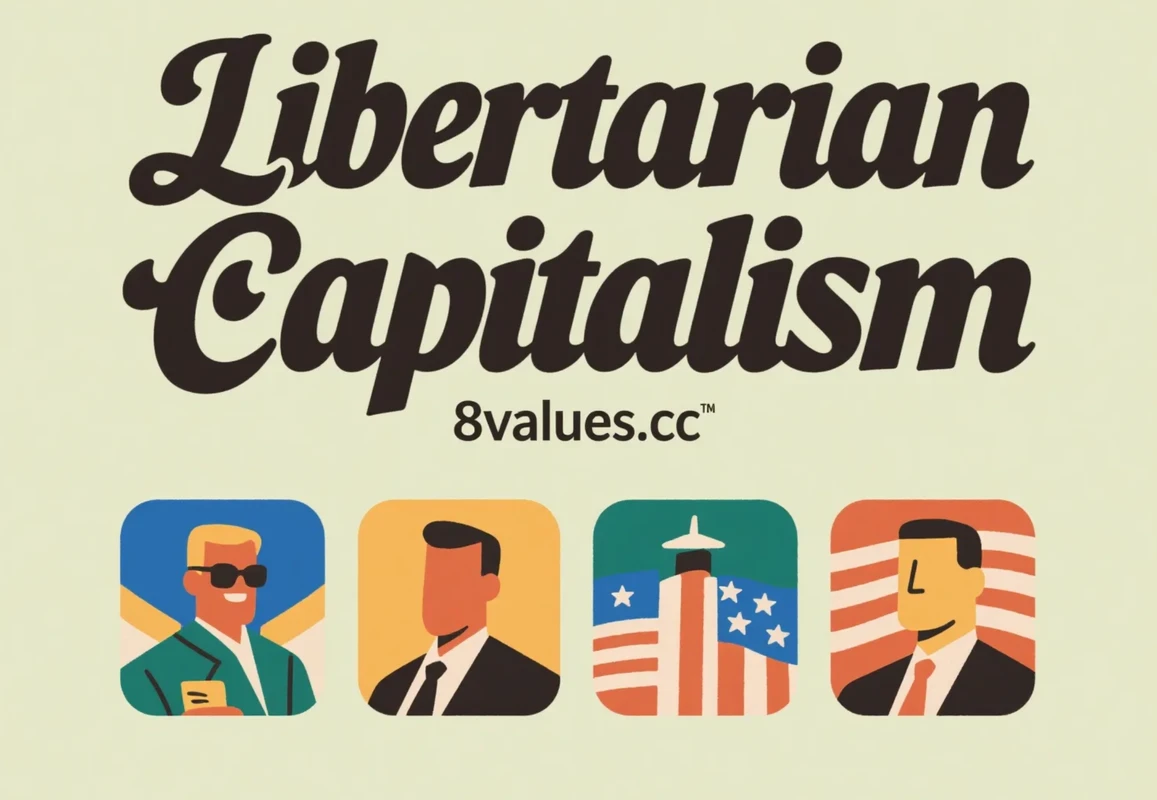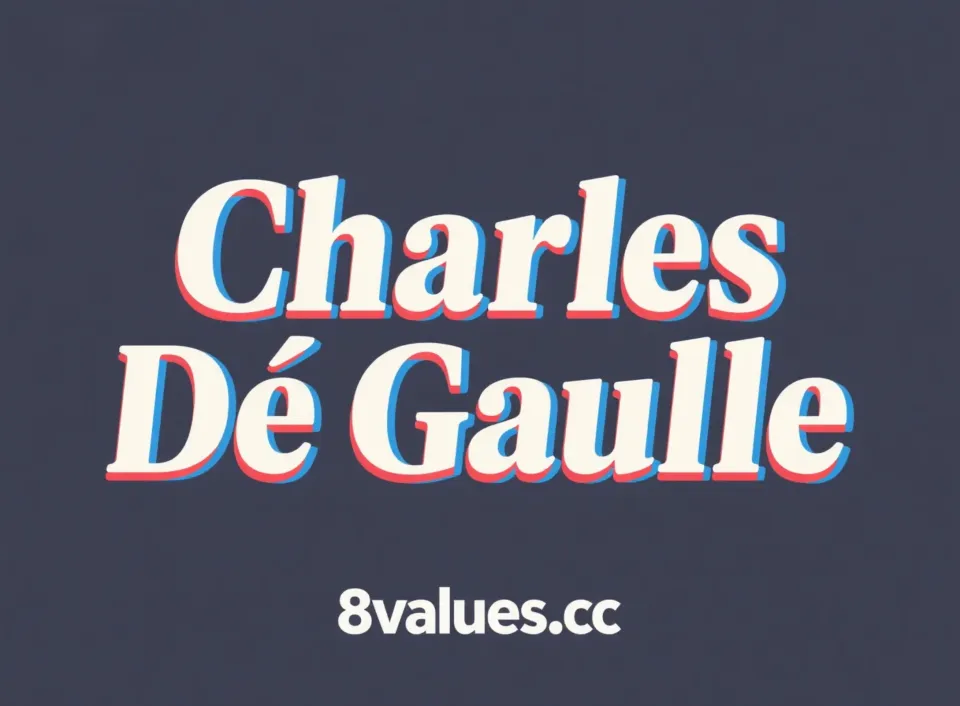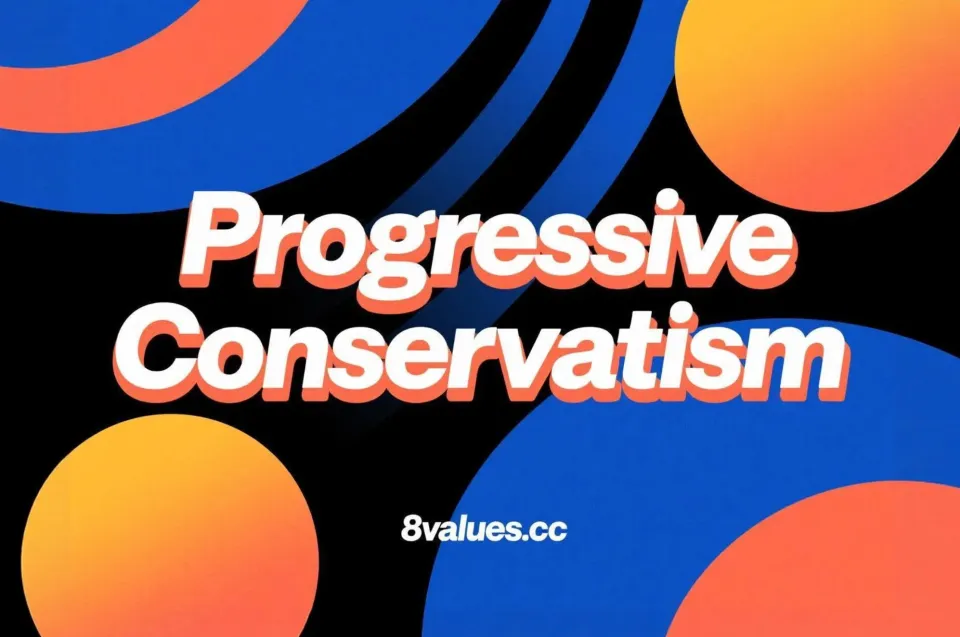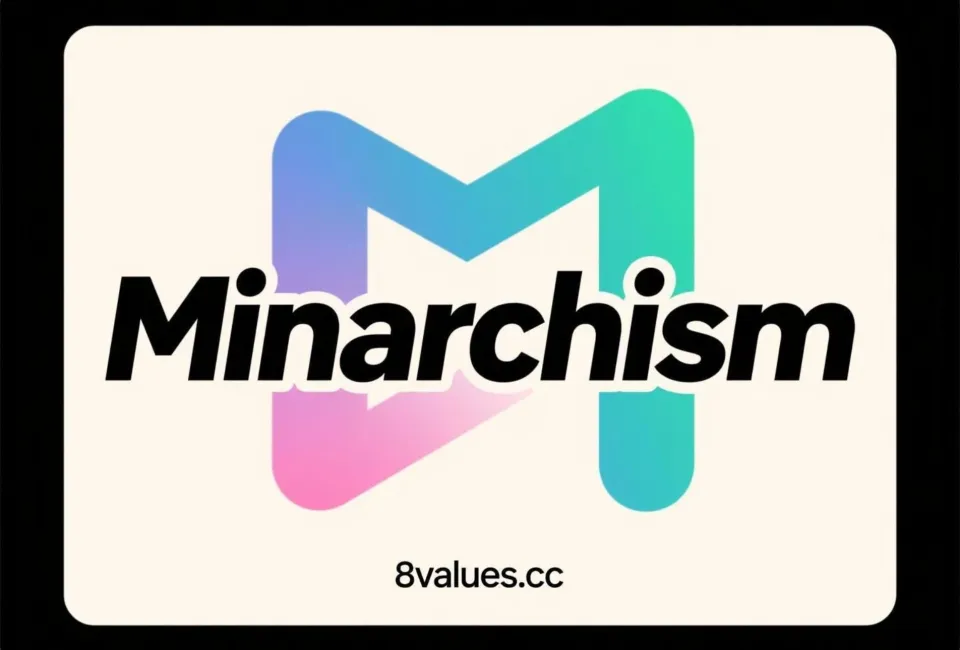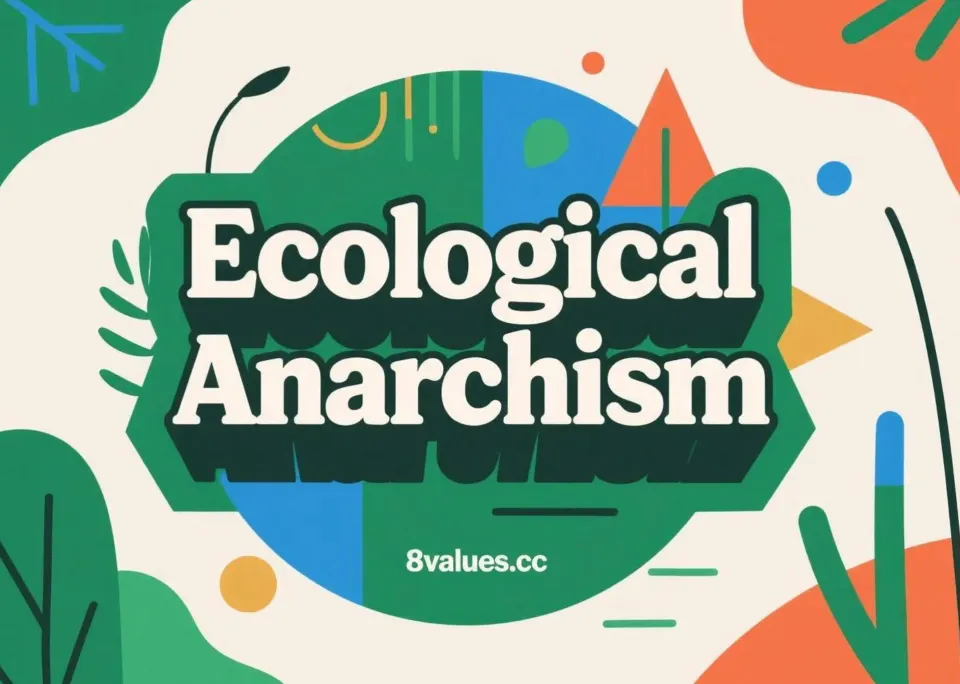Libertarian Capitalism | 8values Interpretation of ideological ideology in political tests
Explore the core concepts, historical evolution, internal tension and social influence of free will capitalism. This article will provide you with a detailed interpretation of this political philosophy based on personal freedom and market economy, helping you to understand ideological results more deeply in the 8values political test.
Libertarian Capitalism , also known as Right-libertarianism or libertarianism , is a political philosophy that places the principles of individual freedom, private property rights and free markets at the core. It advocates maximizing individual freedoms while minimizing or abolishing government powers entirely. In today's diverse and complex political landscape, understanding the essence of free will capitalism is crucial to conduct political spectral coordinate analysis such as 8 values political tests , so as to accurately grasp the ideological positioning of oneself and others.
The core principles and concepts of free will capitalism
The theoretical foundation of free will capitalism is based on a series of clear principles that together construct its vision of ideal social forms:
Individual autonomy and self-ownership
Free will capitalism regards individuals as the basic unit of social analysis, believing that only individuals can make choices and be responsible for their actions. Self-ownership is the basis of this philosophy, which means that everyone has absolute control over themselves (both body and mind) and cannot be violated by others or groups (both governments). This emphasis on individual dignity is one of the keys to the great victory of liberalism in the Western world, and it promotes the expansion of rights to more people, such as women, people of different religions and races.
Private property rights and free market
Libertarians believe that because individuals are moral subjects, they have the right to protect their lives, freedoms and property . These rights are not granted by government or society, but are inherent in human nature. Private property rights are regarded as the cornerstone of personal freedom, which includes not only ownership of items created through labor or found in a natural, unused state, but also the right to exchange property through voluntary agreements.
On this basis, Free Markets is regarded as the economic system of free individuals and is a necessary condition for creating wealth. Free will capitalists firmly believe that if government intervention in people’s economic choices is minimized, people will be freer and more prosperous. The market coordinates the production and distribution of goods and services through spontaneous adjustments, and enterprises independently decide what to produce, how to produce and how much to produce according to market demand.
Limited Government and the Principle of Non-Infringement
Free will capitalism has a strong disgust against centralized power because "power tends to be corrupt, absolute power is absolutely corrupt." Therefore, it advocates restricting government powers, usually through written constitutions to enumerate and restrict the powers granted to governments by the people. The main function of the government is limited to protecting individual rights such as life, freedom and property rather than providing a wide range of social services.
The non-aggression principle (NAP) is the cornerstone of liberalism, including right-wing liberalism. It prohibits anyone from infringing on the rights and property of others through force or fraud without being provoked. This means that any form of violence is unacceptable except for self-defense counterattacks. Taxation, in the eyes of most liberalists, is equivalent to robbery if not based on voluntary purposes, because the government imposes taxation infringes on the property rights of an individual.
The History of Free Will Capitalism
The development of free-will capitalism's ideological development has been over the centuries, and its prototype can be traced back to ancient China, Greece and Israel, and has gradually formed modern liberalist philosophy in the works of thinkers such as John Locke, David Hume, Adam Smith, Thomas Jefferson and Thomas Paine in the 17th and 18th centuries.
The legacy of classical liberalism
Free-will capitalism is often seen as a continuation or radicalization of Classical Liberalism . In the 18th century Enlightenment era, Locke proposed the social contract theory of "ruling with the consent of the ruled" through the concept of natural rights, emphasizing that the purpose of the government is to protect citizens' natural rights. Adam Smith's economic theory advocates government non-intervention policy (laissez-faire) , believing that this will allow individuals to freely exert their talents and improve labor efficiency. These ideas were reflected in the American independence movement , and Jefferson's "the best government is the least managed government" became one of his core propositions.
The 20th Century Revival and Right-wing Turn
In the early 20th century, with the rise of progressivism and various socialist movements, many mainstream parties gradually deviated from the concept of classical liberalism and more actively advocated government intervention to enhance "positive freedom." At this time, scholars such as Ludwig von Mises and Friedrich Hayek of the Austrian Economic School began to challenge various forms of collectivism and advocated that liberalism is consistent with economic efficiency, which is the most effective way to promote social welfare.
In the mid-to-late 20th century, some supporters of anarchist capitalism and minor governmentism in the United States began to use the term "liberal willism". Since then, right-wing liberalism has gradually become the most common form of liberalism in the United States, emphasizing free market capitalism and strong private property rights. This shift was largely due to the fact that other American liberals abandoned classical liberalism in the early 20th century (after the Great Depression and Roosevelt’s New Deal) in favor of progressivism and economic interventionism.
The internal schools and differences of free will capitalism
Despite the core principle of free will capitalism sharing, there are significant differences within specific issues such as the role of the state:
Minarchism
Small governmentists support the establishment of a Night-watchman state , whose only function is to provide citizens with courts, military and police, protect them from aggression, breach of contract, fraud and theft, and enforce property laws. They believe that the state is the necessary evil to protect individuals from violations. Robert Nozick is a well-known advocate of small governmentism, and he believes that only the minimum state can be rationalized without infringing on individual rights.
Anarcho-capitalism
Anarchical capitalism advocates the complete abolition of centralized countries and instead provides all services through the market, including legal, law enforcement and security services. They believe that the state itself violates the principle of non-infringement through taxation and forced monopoly services. Murray Rothbard is the most famous theorist of anarchic capitalism, combining the Austrian school’s free market approach with the 19th-century American individualist anarchists’ rejection of the state, but abandoning their anti-capitalist and labor value theories.
Distinguishing from other liberalisms
The main difference between right-wing libertarianism and left-wing libertarianism is the attitude towards ownership of natural resources. While both support self-ownership and restriction of state power , left-wing libertarianism argues that natural resources should be attributed to all persons in some egalitarian way, or taxes their use to compensate for their exclusive effects. Right-wing liberalism believes that unoccupied natural resources can be occupied by the first person who discovers, mixes labor, or simply claims possession, without the consent of others and without the need to pay others.
The social influence and critical perspective of free will capitalism
Free-will capitalist societies are often portrayed as highly unequal but generally affluent society, thanks to free enterprise, clear property rights and lack of restrained government regulation. However, this model also faces widespread criticism from different perspectives:
Social and environmental unsustainability
Some people believe that although free will capitalism is dynamic and motivated to a certain extent, it is unsustainable in the long run, especially in social and environmental aspects. It can lead to commodification of social relations, devaluation of intangible relations, and an overemphasis on competition and consumerism. For example, excessive profit pursuit may lead to the erosion of family life and non-commercial values, promoting the “24/7” social model.
In addition, the environmental unsustainability of free will capitalism is also a serious problem, such as climate change caused by the use of fossil fuels. Some economists even see it as the largest example of Market Failure , believing that the market cannot automatically provide the right amount of public goods and that private investors lack the motivation to solve problems such as the climate crisis.
Inequality and Exploitation
Critics point out that free will capitalism may exacerbate social inequality and uneven distribution of resources. For example, workers may be forced to accept any wages provided by capitalists without other acceptable options (such as otherwise starving), which limits their “freedom”. In this model, a few people who hold a lot of wealth have great power to set the conditions for others to work for them, thus making others their resources. Early liberalists such as Thomas Paine and Jefferson also pointed out that there is a "parasite" class in society that relies on the labor of others for a living.
Moral limitations and paternal intervention
Free will capitalism usually does not restrict the transfer rights of individuals, which means that in theory everything can be bought and sold, including organs, lifebuoys, and even selling itself into slavery. This has sparked discussions about the boundaries of market morality, critics argue that such unrestricted markets may undermine human dignity, social significance, and moral equality among citizens.
At the same time, liberalism's opposition to paternalistic intervention is often seen as its extreme. For example, even for the sake of the individual's own benefit (such as forced seat belt wear), the government has no right to interfere with the free choice of individuals. This leads to ongoing debate on whether small-scale violations should be allowed for the public good.
Questions about democracy
Some right-wing liberalists, especially those influenced by the ideas of James M. Buchanan and Charles Koch, have doubts and even disgusts about democracy itself. They believe that democracy may lead to “tyranny of the majority” and violate the property rights of minorities through taxation and government intervention. To limit the negative effects of democracy, they even proposed to limit voting rights, such as property owners, educated people, or people with jobs.
Conclusion: Understanding the complexity of free will capitalism
As a profound and rich political philosophy , free will capitalism has continuously evolved throughout history and has taken different appearances as social background changes. It emphasizes the inviolability of individual freedoms , private property rights and free markets and is committed to minimizing government intervention . However, its inherent tension, conflict with the notion of equality and challenges in social and environmental sustainability make it a controversial and critical field.
Understanding the diverse perspectives and complexities of free will capitalism will help us understand modern political thought more comprehensively. If you are curious about the free will capitalist results you get in the 8values political test , or want to explore more political ideology further, please visit the 8values Quiz for the test, or check the Ideological Results page for more details. In addition, you can find more articles on political theory and its real-life applications in our blog .
